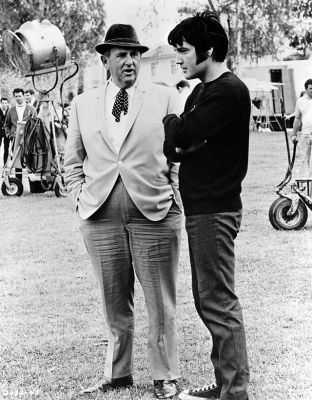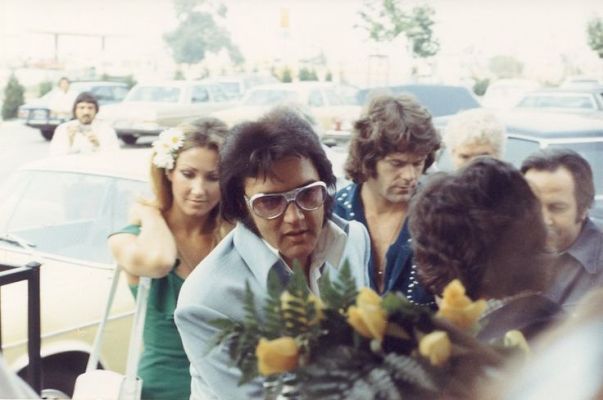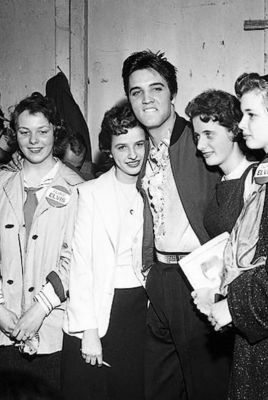
Special to ELVIS: Promised Land, an interview with the author of the book “Operation Gratitude. Kill Colonel Parker”
A few days ago, a book entitled “Operation Gratitude. Kill Colonel Parker” was released. It is a novel in which the authors, Janet Bostic Williams and Selwyn Millborrow, skillfully intertwine the facts of Elvis Presley’s life with the fictional story of two of his fans who set themselves the goal of… saving their idol from his con artist manager.
And although this is just literary fiction, perfect for summer evenings, it turns out that the book’s co-author, Janet Bostic Williams, has some very real memories of Elvis Presley. And it’s about them, as well as her new book, that she agreed to tell me. Read on.
In 1965, Elvis Presley played the role of singer Rusty Martin in the musical comedy “Girl Happy”. Does this film have a very special meaning for you? Can you tell me why? How did your adventure with Elvis begin? Was Elvis’ music always present in your home? Did your parents listen to it, for example?
“Girl Happy” from 1965 was the moment I saw Elvis Presley for the first time. My older brother was tasked with taking me to the screening, which he wasn’t particularly thrilled about because I only occasionally behaved well. To his surprise, however, this time I sat still during the film and stared at the screen. I remember it very well. When we left the cinema I asked him, “What’s that man’s name?” “Elvis Presley,” he replied. “I like him,” I said. The rest is history. Thus began the story of a then five-year-old girl.
Elvis’ music was rarely a presence in my home. My parents let me listen to it, but it wasn’t in their area of interest. Nevertheless, they allowed me to cultivate my newfound love.
2. You were very lucky to be able to watch your idol not only on the big screen but also during his ‘live’ concerts. Please tell me how many of Elvis’ concerts you have seen (do you remember where and when exactly it was)? How do you remember them? What were your feelings during your first concert (the moment you saw Elvis ‘live’ for the first time. Up until now you only knew him from films and press materials. Did your idea of him match reality? I often hear from fans that Elvis live was even better than the one you could see on TV etc.)? Did any of them stick in your memory in a special way?
Yes, I was lucky enough to see Elvis ‘live’ four times. The first time was in February 1970 at the Houston Livestock Show And Rodeo. I went with my grandmother and our seats were very far from the stage. Still, I was happy to be in the same building and breathing the same air as him.
When he first appeared on stage I couldn’t believe it. I was so excited to see him ‘in person’. He was just as handsome as he was on screen.

I saw him again in 1974 and 1975. I watched both concerts from a distance, but in August 1976 I was standing in the front row. Just a few feet away from him. It was a dream come true.
Wonderful. And during those performances, did you manage to meet or talk to Elvis (e.g. backstage)? When were you closest to your idol? Was it then, in 1976? In the introduction to your book, which I would like to ask you about in a moment, we can read about events from 1976… “a white rose, a scarf and a dazzling smile “. Can you explain what exactly that was about?
Yes. In 1976 I was standing just a few meters away from him, and since I was a young (I was sixteen) charming girl at the time, I managed to get his attention. He approached me because he noticed I had brought roses. He smiled and asked if they were for him. I was shy, so all I could do was nod. In exchange for the flowers I received a white scarf from him. Before I could react, someone snatched it from me. I stood there stunned. However, Elvis saw what had happened, stopped what he was doing, and went back to Charlie Hodge for another scarf. He brought it to me, put it around my neck, smiled, and kissed me, saying, “Now, look after it, honey.” And he winked at me. It was a moment I will never forget, and it showed me the measure of a man.
What an incredible story! In your book we also read about your regular visits to Graceland. Did you go to the musical gate to meet/see Elvis? Reading your book, I was intrigued by the mention of your ” intrusion ” on the grounds of Presley’s estate in 1976? How did it happen? How did you manage to get past the musical gate, security etc and enter the grounds of Elvis’ residence?
In July 1976, my parents and I went on a family vacation. We were traveling from South Texas to East Tennessee, where my mother was from. It was then that my parents agreed to pull out of their way and make a trip to Memphis for me to see Graceland and, I hoped, meet Elvis.
We arrived in town late Sunday night and checked into our hotel right away. The next morning, my father and I set out to find Graceland. This was long before it was a tourist attraction and was just a house.
We knew the address, we had a map, and we still had to stop twice to get directions. I’ll never forget driving south on Highway 51 South when the limestone wall in front of the property came into view. “There it is!” I screamed, and my poor dad almost crashed the car.
We parked, got out of the car and walked up to the open gate. I was mesmerized when I saw where I was. At that moment my dad started talking to the guard, Elvis’ uncle, Vester Presley. Unfortunately, Elvis wasn’t home at the time. He was on tour. Dad convinced him (Vester, author’s note) to take us to his mansion. Which he did, loading us into a pink jeep. We drove up to the front of the mansion where I was photographed on the porch. I was tempted to try and open the front door.
There were cars parked in the driveway. We just looked in Elvis’ bedroom window. It was a very exciting feeling to be in Elvis’ house.
I owe so much to my wonderful, late father who understood how important all of these things were to me. I will always cherish these memories.
After Elvis’ death, you didn’t stop being interested in him and you’re still involved in his legacy, bringing him closer to the next generations. You run a very popular Facebook group, “Elvis. A Celebration Of The Man And His Music”, you worked for the TCB Radio Network and a few days ago your first book went on sale – “Operation Gratitutde. Kill Colonel Parker”. A novel in which you skillfully intertwine facts from Elvis’ life with a fictional story of two fans. Where did the idea come from (what inspired you) to write it? Why did you choose this form (for example, you didn’t want to describe your memories from concerts and publish them in the form of a book, etc.)?
I’ve always loved reading and writing. And I also like Elvis. What better way to combine these interests? I’ve written a lot of articles for a Facebook group I help run. The group has about ninety-four thousand members and is very active.
A few years ago I also had the opportunity to write for TCB Radio Network and as it turned out, it was a very good move that allowed me to make some extraordinary acquaintances and contacts.
It was through them that Selwyn Millborow, a member of our FB group, contacted me. He liked many of the articles and essays I had written and proposed collaborating on a fictional novel based on facts. That was the beginning of our brainstorming and writing adventure. Interestingly, we had never met in person. He lives in South Africa and I live in the United States. For several years, to complete our project, we communicated only via email and Zoom.
I liked the idea of writing a novel because it would take a completely different perspective than many of the Elvis books that have been done so far. Although our book is about Elvis, it is not exclusively about him.
In my time managing fan groups, I’ve seen and heard too many stories about overzealous fans, including one that could have actually happened. Elvis fans are crazy passionate, and I wanted to include that aspect.

The title of your novel is very intriguing. “Operation Gratitude. Killing Colonel Parker”. I think that in a way it expresses (especially its second part) what the huge group of Elvis fans felt and still feel and think for years, who blame Parker for Presley’s premature death (this motif even appears in Baz Luhrmann’s film). Why do you think the fans almost passed sentence on Parker? Do you agree with this opinion (that Parker is responsible for Elvis’ death) or do you have your own thoughts on the subject?
As I mentioned, Elvis fans are often so devoted that they blame everything bad – negative – on everything else but Elvis himself. Granted, many people see Parker as the ultimate villain, similar to Priscilla or the Memphis Mafia… All of this contributed a little to Elvis’ downfall and death, but the truth is that Elvis was a grown man who could make his own decisions.
Unfortunately, it was also the perfect setting for problems to arise that no one recognized at the time. Not even Elvis. I think it’s very unfair to blame one person one way.
Let’s stay for a moment on the subject of Colonel Parker, who in Elvis’ biography is not so much a controversial figure as he is very often presented as a so-called villain. Meanwhile, several of Elvis’ close associates, with whom I spoke, assessed him very well, claiming that ” he knew what was good for him and did everything to keep him at the top “. In turn, shortly after the premiere of Baz Luhrman’s film, the manager of one of the most popular Polish singers shared a reflection on the Internet that allowed me to look at the Elvis-Parker relationship from a slightly different perspective. ” A manager is there to take care of business. That’s why I don’t agree with the opinions that he was the cause of Elvis’s failure in life “, he wrote. ” Parker brought Elvis to the top. And that his methods were often controversial? You don’t ask a winner if he’s right “. Do you agree with these opinions? Do you think Colonel Parker was a good manager? Or do you share the opinion of those who believe that the Colonel was only good at the beginning of Elvis’s career? How do you think Presley’s career would have turned out if he had actually fired his manager? What do you think was Parker’s greatest achievement and biggest mistake in Elvis’ career?
Well, Parker was a good manager, and more importantly, an even better promoter. His job was to make deals and fill venues (e.g. concert halls), which he did just as well. He was a marketing genius for his time.
A good manager should have a sense of his client’s artistic direction, and Parker didn’t have that. He had neither the artistic flair nor the artistic drive. I’m even inclined to think that after “Comeback Special,” and especially after “Aloha From Hawaii,” the new manager could and would have made changes that would have been life-or-death in this case.
Your book, although in a way it is only a fictional story, touches on a real, serious problem and forces (or at least forced me) to some deeper reflection. Namely, the heroes of your book are fans who try to protect Elvis from their manager, a fraud. They blame him for all the failures, business mistakes and finally the loss of their idol’s health, etc. In reality, in 1977 Dave Hebler uttered significant words – ” can you protect a forty-two-year-old man from himself? “. In your opinion, could the story you tell in the book really happen? Would Elvis, who as we know had a very strong character and as his ex-wife, Priscilla, confessed in one of her interviews, hated when someone told him what to do, listen to his fans? Do you think he would let them help him if they asked him to? On the other hand, we know that he had a very special contact with them (especially during his stay in Europe, he asked them about current trends in music, etc., and his thanks to them were even included on the cover of the album “A Date With Elvis”).
Elvis understood and accepted his roots. He was also a proud man from an era where admitting any shortcomings could be seen as weakness. I truly believe he felt he had it all under control until the moment he suddenly found himself not.
I think he also realized that it was time to make some serious changes. And he was on the verge of making them, but he just didn’t have the time.
As painful as it sounds now, if his fans weren’t so overzealous, maybe it could have somehow influenced his decisions and maybe he could have changed something. Although admitting his mistake and accepting help would be difficult. Maybe he was too far away to see things clearly.
None of this has any bearing on the love and respect. It is simply an opinion based on love and care. Elvis deserved more than he received in many ways. Above all else, Elvis never wanted to let his fans down and it cost him dearly.
Speaking of fans, it is impossible to ignore a very important fact here. You collaborated on your book with several people, including Selwyn Milborrow, my dear friend Lisa Lauren, and Elvis’ super fan and friend Sandi Miller. Please tell us how this collaboration went? How long did it take you to write this book? Was it difficult to convince these people to collaborate? How did they react to your idea?
I’ve already mentioned Selwyn, a brilliant writer. Lisa and Sandi joined us more after the fact, giving great insight into Elvis’ world. I really appreciate that.
This book has been a project that has been ongoing for almost five years. Collaborating with others has been easy because we all wanted to show our love and respect for Elvis. In return for all that he has given us, individually and collectively, as fans.

On your website you wrote that Elvis deserves the truth. Unfortunately, I have the impression that in today’s world this truth is becoming increasingly difficult to find. On the Internet and in the media, false and sometimes even offensive information about Elvis appears all the time (also here in Poland, where due to the long-standing political system, Elvis was either spoken badly about or not spoken at all). The media seems to operate according to the principle that the bigger the sensation, the better the clicks. It doesn’t matter whether the story told is true and supported by any facts. How do you deal with this? How do you react to such texts? Do you try to deny them (e.g. in your group)? Are these contemporary articles different from those that appeared during Elvis’s lifetime?
Of course, Photoshopped photos that flood the Internet are also a huge problem. Some of them are unfortunately so good that many people mistake them for authenticity, when in fact they simply falsify history… What is your attitude to this type of “edited photos”?
Elvis once said, “Truth is like the sun. You can turn it off for a moment, but it doesn’t go away.” Our group does not allow disrespect to Elvis, his family members, friends, etc. There are too many positives to focus on the negatives, or perceived negatives. That doesn’t mean we whitewash certain facts, but we simply don’t dwell on them. There is a very fine line.
We believe that welcoming members into a group is like inviting someone into your home. If they are not respectful, they are not welcome. We try to eliminate them. Likewise, materials and photos that have been enhanced with Photoshop. There is no need to present them. There is so much good and credible stuff.
And the negative media coverage? It’s nothing new. Elvis fans know the truth.
Recently we have had the premiere of two high profile films about Elvis, Baz Luhrmann’s “ELVIS” and Sophie Coppola’s “Priscilla”. Which of these films do you think is closest to the truth and shows the most true image of Elvis? What is your opinion on both of these productions?
I liked ” ELVIS” but as a fan and historian, the glaring omissions and discrepancies were painfully obvious. The costumes and locations were perfect and the music was authentic. However, I do not believe that Elvis “ended” after the divorce, as presented. I saw that as a clear misrepresentation.
I accepted the film for what it was, aware that it was not a documentary, much less a reflection of his (Elvis, author’s note) last years.
As for “PRISCILLA”, that was her story and her perspective. So it’s hard to speculate on the truth. I’m not a fan of Priscilla, but I don’t hate her either. She was just part of Elvis’ story. So it’s not my personal bias, but I thought the movie was slow and boring. But that’s just my opinion.
Finally, let’s get back to your book, which is currently available for pre-order. Please tell me where we can buy it and do you already have an idea for the next volumes (or maybe completely different publications)?
We have a website, Presleystories.com, where you can order a signed copy of the book. I also blog and post interesting tidbits there. I don’t want it to be just for ordering.
I already have some ideas for future volumes and I would like to present them if fans are interested.
I also have another book almost finished, not about Presley at all. It’s a fictional historical novel about a young woman born in the 1920s, who is affected by poverty and the war years. The novel then shows how modern changes in the mid-20th century affect the issues of the heroine’s adolescence.

Just a few days ago, on July 5, we celebrated the 70th anniversary of Elvis’ recording of “That’s All Right (Mama)”, which started a real revolution in music (and not only) popular music around the world. Please tell me what, in your opinion, the Elvis Presley phenomenon was/is? Why is he still a man loved and admired by millions of people around the world (including here in Poland)?
In short, Elvis Presley changed society musically, culturally, and emotionally. Teenagers were no longer just growing adults, but suddenly they were important. The cultural landscape changed from plain vanilla to a world of colorful choices.
Elvis came along at the right time and place to do all of these things in the right way and get the world’s attention. His intense connection with his fans became a pathway to self-worth. And that ripple went in both directions. He was a surrogate boyfriend, brother, friend and son, and the bond between him and his fans was real. He filled a void, stayed true to his roots and made his fans feel important. He was family and will always be part of family. He still brings people together.
An example would be a girl from Texas writing about him and people from Poland reading her thoughts. And it’s all because of the special attachment and love for Elvis Aaron Presley.
Thank you
I would like to thank Lisa Lauren for her assistance with the interview.
